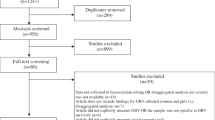Abstract
There is growing demand for robust evidence to address complex social phenomena such as violence against women and girls (VAWG). Research partnerships between scientists and non-governmental or international organizations (NGO/IO) are increasingly popular, but can pose challenges, including concerns about potential conflicts of interest. Drawing on our experience collaborating on VAWG research, we describe challenges and contributions that NGO/IO and academic partners can make at different stages of the research process and the effects that collaborations can have on scientific inquiry. Partners may struggle with differing priorities and misunderstandings about roles, limitations, and intentions. Benefits of partnerships include a shared vision of study goals, differing and complementary expertise, mutual respect, and a history of constructive collaboration. Our experience suggests that when investigating multi-faceted social problems, instead of ‘rigging’ study results, research collaborations can strengthen scientific rigor and offer the greatest potential for impact in the communities we seek to serve.



Similar content being viewed by others
References
Bonell, C., Fletcher, A., Morton, M., Lorenc, T. and Moore, L. (2012) Realist randomised controlled trials: A new approach to evaluating complex public health interventions. Social Science and Medicine 75(12): 2299–2306.
Kazi, M. (2003) Realist evaluation for practice. British Journal of Social Work 33(6): 803–818.
Collins, H.M. and Evans, R. (2002) The third wave of science studies: Studies of expertise and experience. Social Studies of Science 32(2): 235–296.
Ferguson, G. (2015) Working with academics: it gets easier. Honestly. The Guardian. Accessed 10 December.
Shepperd, S., Lewin, S., Straus, S., Clarke, M., Eccles, M.P., Fitzpatrick, R. et al (2009) Can we systematically review studies that evaluate complex interventions? PLoS Medicine 6(8): e1000086.
Smith, S., Ward, V. and House, A. (2011) “Impact” in the proposals for the UK’s research excellence framework: Shifting the boundaries of academic autonomy. Research Policy 40(10): 1369–1379.
Ptáčková, K. (2012) Professional curiosity engaged in policy sociology. Human Affairs 22(4): 475–491.
Devries, K.M., Mak, J.Y.T., García-Moreno, C., Petzold, M., Child, J.C., Falder, G., Lim, S,. Bacchus, L.J., Engell, R.E., Rosenfeld, L., Pallitto, C., Vos, T., Abrahams, N. and Watts, C.H. (2013) Global health. The global prevalence of intimate partner violence against women. Science 340(6140): 1527–1528.
UN General Assembly. (1993) Declaration on the elimination of violence against women. In 85th Plenary Meeting A/RES/48/104. Accessed 20 December 1993.
Michau, L., Horn, J., Bank, A., Dutt, M. and Zimmerman, C. (2015) Prevention of violence against women and girls: Lessons from practice. The Lancet 385(9978): 1672–1684.
Abramsky, T., Devries, K., Kiss, L., Nakuti, J., Kyegombe, N., Starmann, E. et al (2014) Findings from the SASA! Study: a cluster randomized controlled trial to assess the impact of a community mobilization intervention to prevent violence against women and reduce HIV risk in Kampala, Uganda. BMC Medicine 12(1): 122.
Craig, P., Dieppe, P., Macintyre, S., Michie, S., Nazareth, I., and Petticrew, M. (2008) Developing and Evaluating Complex Interventions: New Guidance. London, UK: Medical Research Council.
Davies, H., Nutley, S., and Walter, I. (2005) Approaches to assessing the non-academic impact of social science research. St. Andrews, Scotland: Research Unit of Research (May): 1–35.
Heise, L. L. What works to prevent partner violence? An evidence overview. STRIVE Research Consortium, London School of Hygiene and Tropical Medicine, London, UK (2011) xvii + 108 pp. ISBN 978-0-902657-85-2. Link: http://r4d.dfid.gov.uk/PDF/Outputs/Gender/60887-PartnerViolenceEvidenceOverview.pdf. Accessed 3 May 2016.
Kyegombe, N., Abramsky, T., Devries, K.M., Starmann, E., Michau, L., Nakuti, J., Musuya, T., Heise, L. and Watts, C. (2014) The impact of SASA!, a community mobilization intervention, on reported HIV-related risk behaviours and relationship dynamics in Kampala, Uganda. Journal of the International AIDS Society 17 (Nov): 19232.
Hossain, M., Zimmerman, C., Kiss, L., Abramsky, T., Kone, D., Bakayoko-Topolska, M. and Watts, C. (2014) Working with men to prevent intimate partner violence in a conflict-affected setting: A pilot cluster randomized controlled trial in rural Côte d’Ivoire. BMC Public Health 14: 339.
Zimmerman, C., Kiss, L. and Hossain, M. (2011a) Migration and health: A framework for 21st century policy-making. PLoS Medicine, 8(5), 2016. doi:10.1371/journal.pmed.1001034. Accessed 3 May.
Zimmerman, C., Watts, C. and Hossain, M. (2011b) Human trafficking and health: Conceptual frameworks to inform policy, intervention and research. Social Science and Medicine 73(2): 327–335.
Zimmerman, C., Stöckl, H. Understanding and addressing violence against women. Human trafficking. World Health Organization (WHO), Pan American Health Organization (PAHO). (2012) Geneva. http://apps.who.int/iris/bitstream/10665/77394/1/WHO_RHR_12.42_eng.pdf. Accessed 3 May 2016.
Zimmerman, C. and Watts, C. (2003) WHO ethical and safety recommendations for interviewing trafficked women. Geneva: World Health Organization (WHO).
Ellsberg, M. and Heise, L. (1999) Putting Women’s Safety First: Ethical and Safety Recommendations for Research on Domestic Violence Against Women. Geneva: World Health Organization (WHO).
Ellsberg, M., Heise, L., Peña, R., Agurto, S. and Winkvist, A. (2003) Researching domestic violence against women: Methodological and ethical considerations. Studies in Family Planning 32(1): 1–6.
Cashman, S.B., Adeky, S., Allen, A. J., Corburn, J., Israel, B. A., Montaño, J. et al (2008) The power and the promise: Working with communities to analyze data, interpret findings, and get to outcomes. American Journal of Public Health 98(8): 1407–1417.
Davies, C. and Ward, H. (2011) Safeguarding Children Across Services. Messages from Research. London, Philadelphia: Jessica Kingsley Publishers.
García-Moreno, C., Zimmerman, C., Morris-Gehring, A., Heise, L., Amin, A., Abrahams, N. et al (2014). Addressing violence against women: A call to action. The Lancet 385(9978): 1685–1695.
Zimmerman, C., Hossain, M., Yun, K. et al (2006a). Stolen smiles: The physical and psychological health consequences of women and adolescents trafficked in Europe. LSHTM.
Zimmerman, C., Hossain, M., Yun, K. et al (2006b). Stolen smiles: A summary report on the physical and psychological health consequences of women and adolescents trafficked in Europe. LSHTM.
Author information
Authors and Affiliations
Corresponding author
Rights and permissions
About this article
Cite this article
Zimmerman, C., Michau, L., Hossain, M. et al. Rigged or rigorous? Partnerships for research and evaluation of complex social problems: Lessons from the field of violence against women and girls. J Public Health Pol 37 (Suppl 1), 95–109 (2016). https://doi.org/10.1057/s41271-016-0006-3
Published:
Issue Date:
DOI: https://doi.org/10.1057/s41271-016-0006-3




